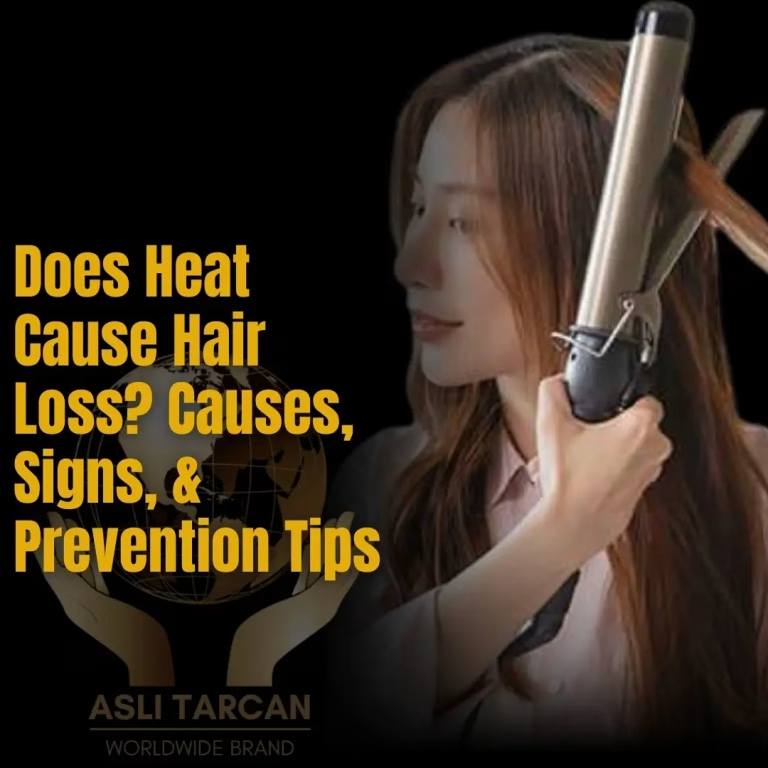Can Lack of Sleep Cause Hair Loss?
We all know that getting enough sleep is essential for feeling refreshed and staying healthy. But many people don’t realize that the amount and quality of sleep they get can also affect something far more visible, their hair.
Hair loss can be caused by many things: genetics, diet, stress, or illness. But sleep deprivation is a lesser-known, yet scientifically supported, contributor. This article explores how lack of sleep can affect your hair, the biological mechanisms behind it, and what you can do to reverse or prevent the damage.
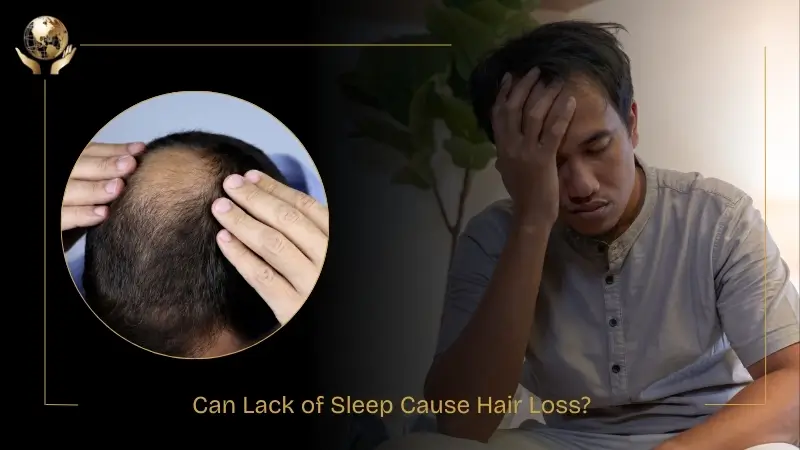
Why Sleep Is Important for Hair Health
Sleep isn’t just rest, it’s recovery. During sleep, your body goes into maintenance mode, repairing cells and producing vital hormones that regulate growth and immune function. Hair follicles, which are among the fastest-growing cells in the body, are directly influenced by this process.
A 2019 global survey by Philips found that 62% of adults suffer from sleep deprivation, and half of the 11,006 respondents believed that sleep has the biggest impact on their health. With such widespread lack of rest, the concern about hair loss becomes more than cosmetic — it’s a health issue.
A long-term Korean study (2002–2013) even found a higher risk of alopecia areata (an autoimmune form of hair loss) in people with sleep disorders.
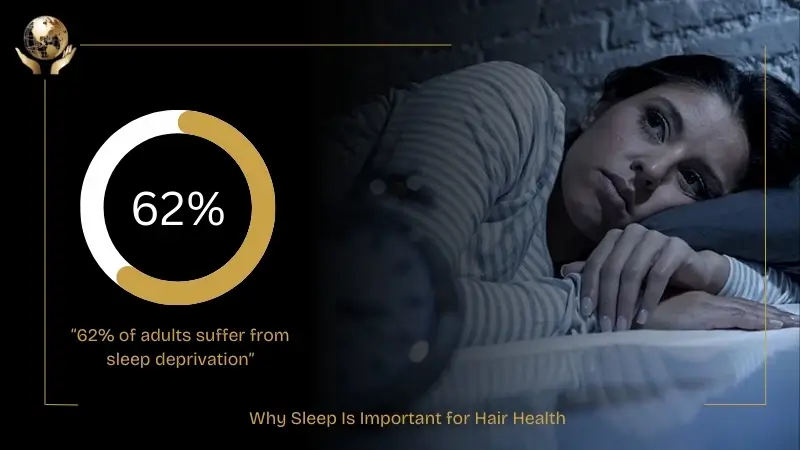
How Lack of Sleep Can Lead to Hair Loss
Sleep deprivation disrupts several processes that are vital to healthy hair. Here are the most important pathways:
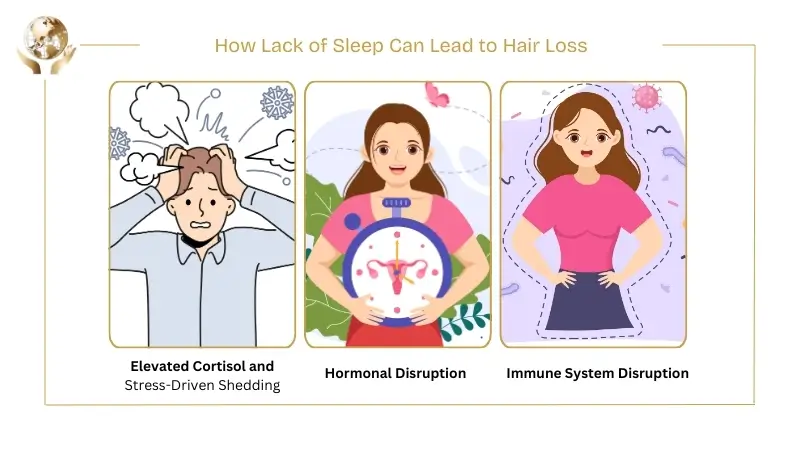
1. Elevated Cortisol and Stress-Driven Shedding
When you sleep poorly, your body releases more cortisol, the stress hormone. This triggers:
- Inflammation in the scalp
- Impaired protein synthesis, needed for strong hair strands
- A higher chance that hair follicles enter the telogen (resting) phase early, leading to excessive shedding — a condition known as telogen effluvium
Our doctors identify stress (especially from sleep loss) as a major cause of this temporary, yet alarming, form of hair loss.
See Also: How To Stimulate Dead Hair Follicle
2. Hormonal Disruption (Melatonin and DHT Sensitivity)
Hormones like melatonin, produced primarily at night, don’t just help you sleep, they regulate cell regeneration and hair follicle cycling.
According to our doctors, sleep deprivation lowers melatonin levels, which may:
- Disrupt hair follicle activity
- Slow or halt hair growth
- Amplify sensitivity to DHT (a testosterone-derived hormone), worsening androgenic alopecia in genetically prone individuals
This means that chronic sleep loss can accelerate pattern hair loss, not just cause shedding.
See Also: Receding Hairline at 20
3. Immune System Disruption and Autoimmune Hair Loss
Poor sleep affects the immune system, and Good Health by Hims highlights that this can trigger autoimmune reactions like alopecia areata, where the body attacks its own hair follicles.
A 2022 study involving 102 adults (half with alopecia areata and half without) found a clear association between sleep quality and autoimmune hair disorders, reinforcing that poor sleep can not only trigger hair loss but also worsen mental health, creating a damaging feedback loop of stress, anxiety, and continued hair fall.
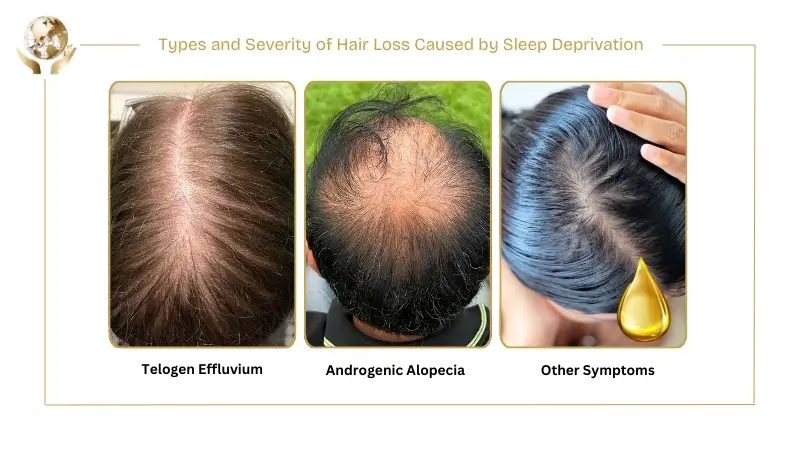
See Also: Does Nizoral Cause Hair Loss
Types and Severity of Hair Loss Caused by Sleep Deprivation
Not all hair loss is equal. Here are the most common types linked to poor sleep:
- Causes sudden, diffuse hair shedding
- Often comes after major stress (like long-term sleep disruption)
- Usually temporary and reversible with lifestyle changes
Androgenic Alopecia
- Genetic pattern baldness (thinning at crown or hairline)
- Can be exacerbated by hormonal changes from chronic sleep loss
Other Symptoms
- Oily scalp, dullness, or greasy hair due to disrupted skin function
- Flare-ups of eczema or psoriasis, which affect scalp health and hair growth
These conditions make hair appear thinner or less vibrant even before actual shedding begins.
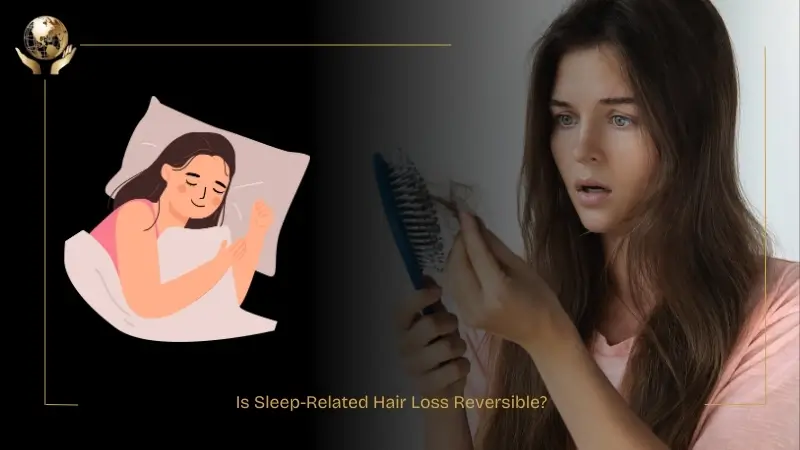
Is Sleep-Related Hair Loss Reversible?
In many cases, yes, especially if it’s related to telogen effluvium.
But regrowth depends on:
- Consistency in sleep quality (7–8 hours per night)
- Addressing other contributing factors like diet, hormones, and stress
- Seeking help if conditions like androgenic alopecia or autoimmune disorders are also present
If sleep deprivation has triggered a deeper or genetic condition, then reversing hair loss may require medical support and ongoing management.
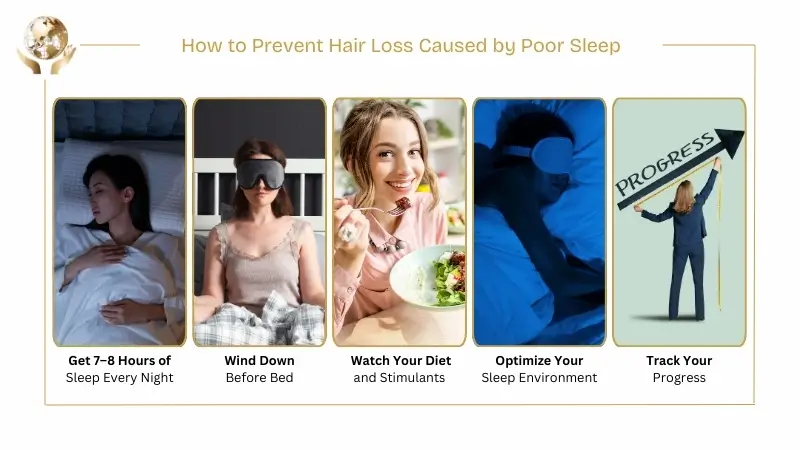
How to Prevent Hair Loss Caused by Poor Sleep
Here’s what multiple clinics recommend to improve sleep and protect your hair:
1. Get 7–8 Hours of Sleep Every Night
This is the minimum recommended by the CDC for adults aged 18–60. Make sleep a non-negotiable part of your health routine.
2. Wind Down Before Bed
- Avoid screens for 30–60 minutes
- Try reading, light yoga, or meditation
- Take a warm shower or practice deep breathing
3. Watch Your Diet and Stimulants
- Limit caffeine and alcohol, especially in the evening
- Eat nutrient-rich meals that support hair health — protein, iron, zinc, and omega-3s are essential
4. Optimize Your Sleep Environment
- Keep your bedroom cool, dark, and quiet
- Remove distractions (TV, smartphone, clutter)
- Consider blackout curtains or white noise if needed
When to Seek Professional Help
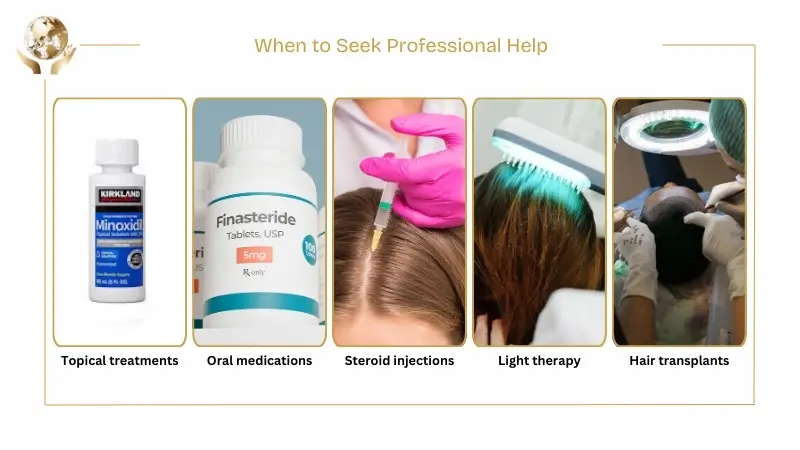
If sleep improvement doesn’t help or if hair loss is severe, consult a trichologist or dermatologist.
They may recommend:
- Topical treatments: like minoxidil
- Oral medications: such as finasteride (for men)
- Steroid injections: for autoimmune conditions
- Light therapy: to stimulate follicles
- Hair transplants: such as the FUE (Follicular Unit Extraction) method.
Getting a proper diagnosis can help you treat the root cause, not just the symptoms.
See Also: Can Headphones Cause Hair Loss?

This article is medically reviewed by Medical Aesthetic Dr. Ali Khalil (PHD)
See Our Doctors & Surgeons
Frequently Asked Questions
Will my hair grow back if I fix my sleep schedule?
If your hair loss was caused by sleep deprivation or stress-related conditions like telogen effluvium, fixing your sleep schedule can help. Restoring proper sleep supports hormonal balance and reduces stress, allowing the hair growth cycle to recover and potentially regrow hair.
How many hours of sleep is needed for hair growth?
For optimal hair growth, adults should get 7 to 9 hours of sleep per night. This duration supports the production of growth hormones and melatonin, which are essential for maintaining healthy hair follicles.
Does 6 hours of sleep cause hair loss?
Consistently getting only 6 hours of sleep can contribute to hair loss over time. It may increase stress hormones like cortisol and disrupt the hair growth cycle, especially if you’re chronically sleep-deprived.
Is lack of sleep hair loss reversible?
Yes, hair loss due to lack of sleep is often reversible, particularly if it’s from temporary stress-related conditions. Improving your sleep can stabilize hormone levels and reduce stress, which helps restart healthy hair growth.
Does sleeping at 1am cause hair loss?
Sleeping at 1am doesn’t directly cause hair loss, but it can contribute if it leads to getting less than 7 hours of rest. Irregular sleep times may also disrupt your circadian rhythm, indirectly affecting hair health.
Does lack of sleep increase DHT?
No, lack of sleep does not increase DHT. In fact, it may lower testosterone levels, which DHT is derived from. Hair loss from poor sleep is more likely due to elevated stress and cortisol rather than increased DHT.




